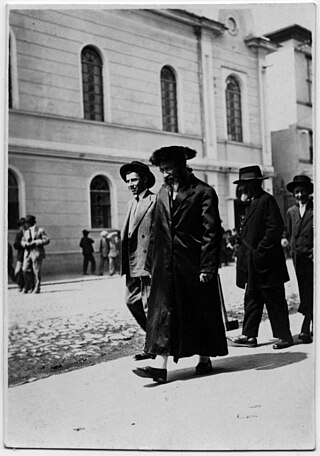
The military occupation of Czechoslovakia by Nazi Germany began with the German annexation of the Sudetenland in 1938, continued with the creation of the Protectorate of Bohemia and Moravia, and by the end of 1944 extended to all parts of Czechoslovakia.

The Czech lands or the Bohemian lands is a historical-geographical term which, in a historical and cultural context, denotes the three historical regions of Bohemia, Moravia, and Czech Silesia out of which Czechoslovakia, and later the Czech Republic, were formed. Together the three have formed the Czech part of Czechoslovakia since 1918, and the Czech Republic since 1 January 1993.

Jews settled in this small region variously called Ruthenia, Carpathian Ruthenia, Sub-Carpathian Ruthenia or simply Transcarpathia as early as the 15th century. Local rulers allowed Jewish citizens to own land and practice many trades that were precluded to them in other locations. Jews settled in the region over time and established communities that built great synagogues, schools, printing houses, businesses, and vineyards. By the end of the 19th century there were as many as 150,000 Jews living in the region.

Ludvík Svoboda was a Czech general and politician. He fought in both World Wars, for which he was regarded as a national hero, and he later served as the president of Czechoslovakia from 1968 to 1975.

The Battle of the Dukla Pass, also known as the Dukla, Carpatho–Dukla, Rzeszów–Dukla, or Dukla–Prešov offensive, was the battle for control over the Dukla Pass on the border between Poland and Slovakia on the Eastern Front of World War II between Nazi Germany and the Soviet Union in September–October 1944. It was part of the Soviet East Carpathian strategic offensive that also included the Carpathian–Uzhgorod offensive. The operation's primary goal, to provide support for the Slovak rebellion, was not achieved, but it concluded the full liberation of the Ukrainian SSR.

The Prague offensive was the last major military operation of World War II in Europe. The offensive was fought on the Eastern Front from 6 May to 11 May 1945. Fought concurrently with the Prague uprising, the offensive significantly helped the liberation of Czechoslovakia in 1945. The offensive was one of the last engagements of World War II in Europe and continued after Nazi Germany's unconditional capitulation on 8/9 May.

Marie Ljalková-Lastoveckánée Petrušáková was a Czech Czechoslovak sniper and member of the 1st Czechoslovak Army Corps who fought in exile in World War II.

Otakar Jaroš was a Czech officer in the Czechoslovak forces in the Soviet Union. He was killed in the Battle of Sokolovo and became the first member of a foreign army decorated with the highest Soviet decoration, Hero of the Soviet Union.

The history of the Jews in the Czech lands, historically the Lands of the Bohemian Crown, including the modern Czech Republic, goes back many centuries. There is evidence that Jews have lived in Moravia and Bohemia since as early as the 10th century. Jewish communities flourished here specifically in the 16th and 17th centuries, and again in the late 19th and early 20th centuries. Local Jews were mostly murdered in the Holocaust, or exiled at various points. As of 2021, there were only about 2,300 Jews estimated to be living in the Czech Republic.
The Czech and Slovak Legion, also known as the Czechoslovak Legion, was a military unit formed in the Second Polish Republic after Germany occupied Czechoslovakia in March 1939. The unit took symbolic part in the defence of Poland during the German invasion on 1 September 1939.

The 1st Czechoslovak Army Corps, also known as Svoboda's Army, was a military formation of the Czechoslovak Army in exile fighting on the Eastern Front alongside the Soviet Red Army in World War II.

The Czechoslovak People's Army was the armed forces of the Communist Party of Czechoslovakia (KSČ) and the Czechoslovak Socialist Republic from 1954 until 1989. From 1955 it was a member force of the Warsaw Pact. On 14 March 1990 the Army's name was officially reverted to the Czechoslovak Army removing the adjective "People's" from the name. The Czechoslovak Army was split into the Army of the Czech Republic and the Armed Forces of the Slovak Republic after the dissolution of Czechoslovakia on 1 January 1993.

Josef Buršík was a Czech resistance fighter, general, dissident, and political prisoner. During World War II, while fighting with the First Czechoslovak Independent Field Battalion, later reorganized as the First Czechoslovak Independent Brigade he was awarded the Gold Medal of the Hero of the Soviet Union.

Karel Klapálek, CBE, DSO was a Czechoslovak Army general and a veteran of the Czechoslovak Legion in the Russian Empire. He fought in both World Wars and was decorated with numerous national honours.

Sokolovo is a 1974 Soviet–Czechoslovak war film made by Otakar Vávra depicting the Battle of Sokolovo in 1943. The film was published in two parts and was meant as the middle part of Vávra's "war trilogy" consisting of movies Days of Betrayal, Sokolovo and Liberation of Prague.

Ludvík Krejčí was a Czechoslovak army general and legionary of the First World War.

Major general Antonín Sochor was a Czechoslovak general who fought for the 1st Czechoslovak Army Corps in the Soviet Union on the Eastern Front.

Zoe Klusáková-Svobodová was a Czech economist, academic, writer and translator. She was the daughter of Ludvík Svoboda, the President of Czechoslovakia from 1968 to 1975, and the widow of Czechoslovak diplomat, Milan Klusák.

















